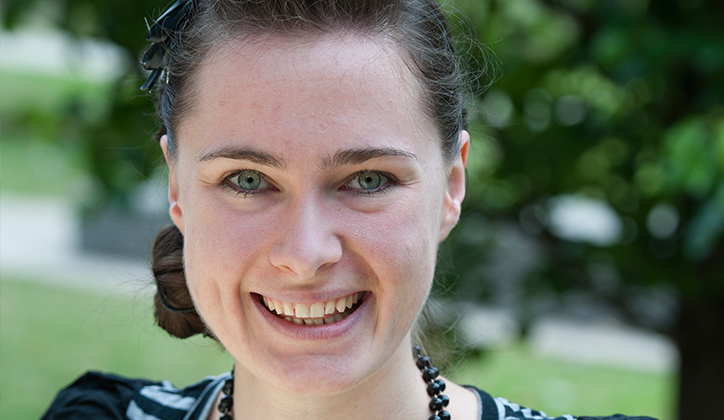PhD candidate Kiri Mealings | Child Language Lab, Department of Linguistics
How long have you been at a researcher at Macquarie?
I have just started my third year as a Linguistics PhD student. For the past four years I have been part of the research team with the Child Language Lab (directed by Distinguished Professor Katherine Demuth) while I was finishing my Bachelor of Science (Mathematics) and Honours in Speech and Hearing Sciences at Macquarie.
I was drawn to research because…
I have always loved learning and problem solving, and doing a research degree allows me to bring together my music, maths, and speech and hearing sciences backgrounds to investigate issues that I am really interested in. Being involved in new research also gives me the opportunity to make a difference in the community.
What would be an ‘elevator pitch’ of your research area?
Open plan classrooms have recently become popular in the UK, Europe, and now Sydney. These classrooms can have up to 200 children in the one area without any walls between the classes, so they are subject to high levels of noise. My research investigates the acoustics (i.e. reverberation/echo, noise levels, and how loud the teacher’s voice is compared to the background noise levels) of open plan primary school classrooms. I am interested in how the acoustics of these classrooms affect young children’s ability to hear their teacher/classmates and to learn, compared to children in quieter enclosed classrooms.
In layman’s terms, what is the wider impact of your research?
I am hoping the results of my research will help us better understand what classroom designs are most appropriate for learning. As children need to learn many new concepts in the early years of primary school, it is very important that they are able to hear and comprehend what their teachers are saying. Our studies show that high levels of noise result in children misperceiving or completely missing what their teacher has said. This is especially the case for children seated at the back of the class. Additionally, high noise levels can lead to increased stress levels, fatigue, and vocal health problems in teachers. Therefore, it is of vital importance that we understand what classroom designs are best for the students and teachers, and whether or not open plan classrooms are suitable learning spaces for young children.
If I were given $1M in research funding, the first thing I would do is…
I would conduct a large scale research project into open plan classrooms. This would help us understand what designs and acoustic treatments work, and what do not work. Then we could work together with educators and architects to design classrooms that combine where possible the positive aspects of open plan classrooms with the acoustic benefits of enclosed classrooms.
I would also investigate the impact of different classroom acoustic environments on children with special educational needs, such as those with hearing/language impairments and attention deficits. This would help us understand what the most appropriate learning spaces for these children might be.
Who is/was your biggest research mentor?
I am incredibly fortunate to have three amazing supervisors for my PhD: Distinguished Professor Katherine Demuth (Director of the Child Language Lab), Dr Jorg Buchholz (research audiologist and engineer), and Adjunct Professor Harvey Dillon (Director of the National Acoustics Laboratories). Each of these highly respected academics has given me much time, patience, inspiration, and encouragement about my research, especially my principal supervisor Katherine Demuth. I have also been very lucky to have many great teachers and supportive family members who have encouraged me throughout my education.

